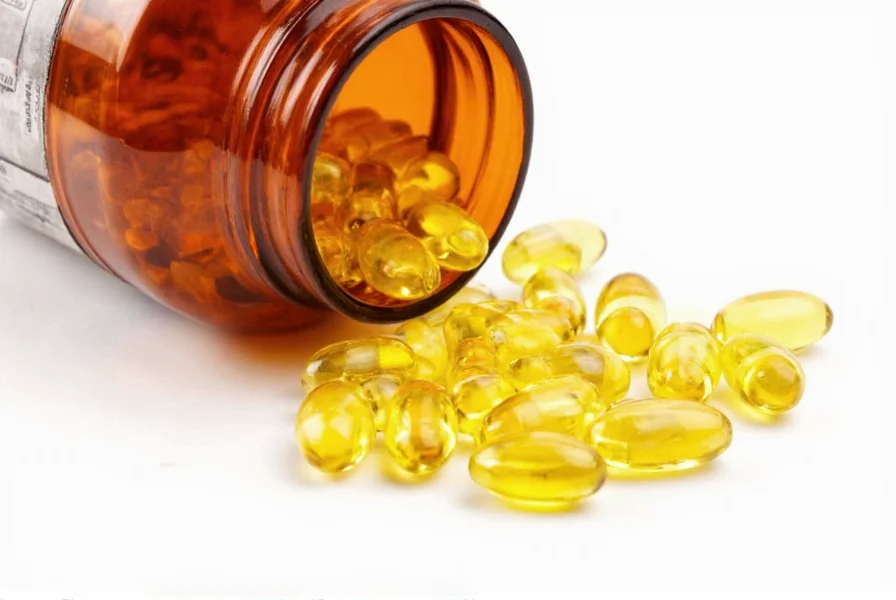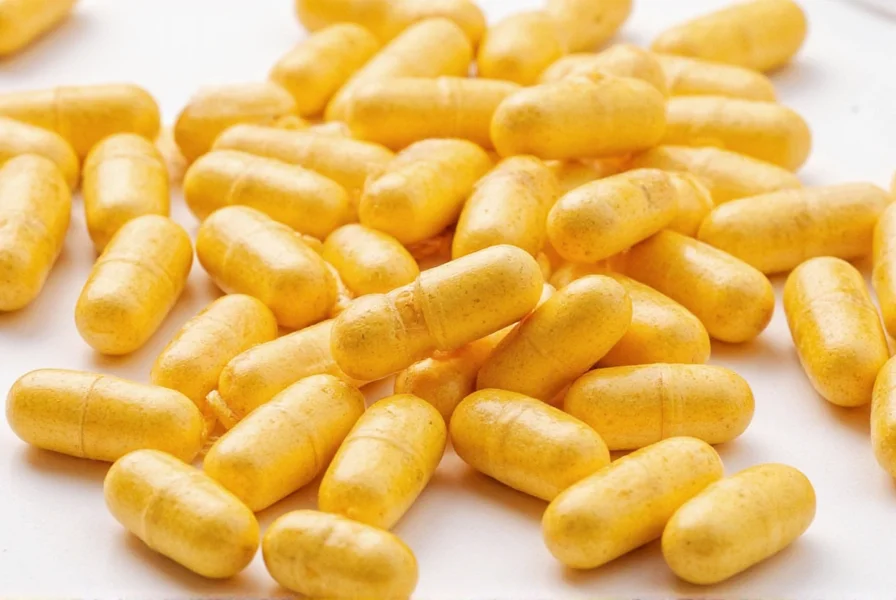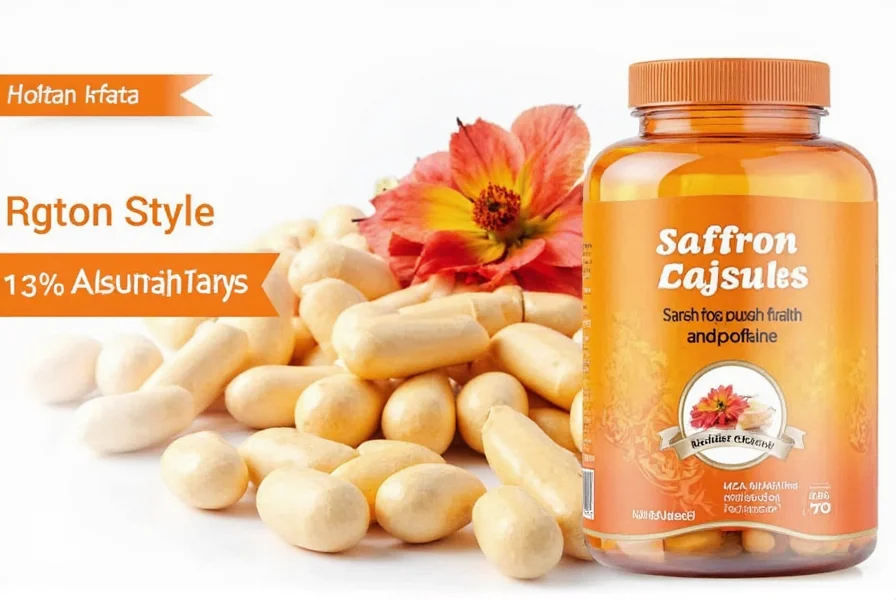Understanding Saffron Capsules: Science-Backed Insights
Saffron capsules have gained significant attention in evidence-based nutrition circles for their potential health benefits. Unlike culinary saffron threads used in cooking, these supplements deliver concentrated bioactive compounds including crocin, crocetin, and safranal - the key components responsible for saffron's therapeutic properties. The most clinically studied saffron extracts for saffron supplement benefits for depression include Affron® (standardized to 3.5% crocin and 0.7% safranal) and Satiereal® (standardized to 2% safranal).

The Science Behind Saffron's Health Benefits
Multiple randomized controlled trials support specific health applications of saffron supplements. For mood support with saffron capsules, a 2020 meta-analysis in Phytomedicine found saffron (30 mg/day) demonstrated comparable efficacy to selective serotonin reuptake inhibitors (SSRIs) for mild-to-moderate depression, with fewer side effects. The mechanism appears related to saffron's ability to modulate serotonin, dopamine, and norepinephrine levels.
Research on saffron capsules for PMS relief shows promising results. A double-blind study published in Complementary Therapies in Medicine reported that women taking 30 mg/day of saffron experienced significantly reduced PMS symptoms compared to placebo, particularly for irritability, mood swings, and cravings.
For eye health, saffron's antioxidant properties may protect retinal cells. A clinical trial in Investigative Ophthalmology & Visual Science demonstrated that 20 mg/day of saffron supplementation improved retinal function in patients with early age-related macular degeneration.
Dosage Guidelines: How Much Saffron Per Day Is Safe
Understanding proper how much saffron per day is safe is critical for safe supplementation. Clinical studies typically use:
| Application | Effective Dose | Duration | Standardized Extract |
|---|---|---|---|
| Depression support | 15-30 mg/day | 6-8 weeks | Affron®, Satiereal® |
| PMS symptom relief | 30 mg/day | Cyclical (days 2-10 of cycle) | Affron® |
| Eye health support | 20 mg/day | 3 months+ | Standardized crocin |
It's important to note that culinary saffron and supplements differ significantly in concentration. While adding saffron to food is generally safe, therapeutic benefits require the standardized extracts found in quality supplements. The scientific evidence on saffron supplements consistently shows that doses below 100 mg/day are well-tolerated for most adults.
Safety Profile and Potential Side Effects
When considering saffron supplement side effects, research indicates that doses up to 100 mg/day are generally well-tolerated for short-term use (8-12 weeks). Common mild side effects may include:
- Dry mouth
- Anxiety or restlessness (at higher doses)
- Nausea
- Headache
- Appetite changes
More serious concerns emerge at higher doses. Consuming more than 1.5 grams of saffron can cause toxic effects including vomiting, dizziness, and in extreme cases (5+ grams), potentially fatal complications. Pregnant women should avoid saffron supplements due to historical evidence suggesting uterine stimulation effects that could increase miscarriage risk.
Individuals taking antidepressants, blood thinners, or blood pressure medications should consult healthcare providers before using saffron supplements due to potential interactions. Those with bipolar disorder should exercise caution as saffron's mood-elevating effects could potentially trigger manic episodes.

Choosing Quality Saffron Supplements
Not all saffron supplements deliver what they promise. When selecting products, look for:
- Standardized extracts with specified crocin and safranal content
- Third-party testing verification (USP, NSF, ConsumerLab)
- Transparent labeling of active compound concentrations
- Reputable manufacturers with good manufacturing practices (GMP) certification
Avoid products making exaggerated claims like "cures depression" or "replaces medication." Legitimate supplements will state they're intended to support health, not treat or cure diseases. The most reliable saffron capsules for mental wellness will reference specific clinical studies supporting their formulation.
When Saffron Capsules May Not Be Appropriate
Despite promising research, saffron supplements aren't suitable for everyone. They should be avoided by:
- Pregnant or breastfeeding women
- Individuals scheduled for surgery within two weeks (due to potential blood pressure effects)
- People with known allergies to saffron or related plants
- Those taking MAO inhibitors or other psychiatric medications without medical supervision
Always consult with a healthcare provider before starting saffron supplements, especially if you have underlying health conditions or take prescription medications. Saffron should complement, not replace, conventional treatments for serious health conditions.
Frequently Asked Questions
How long does it take for saffron capsules to work for depression?
Most clinical studies show noticeable mood improvements within 2-4 weeks of consistent daily use at 15-30 mg of standardized extract. Full effects typically appear by 6-8 weeks. Unlike pharmaceutical antidepressants which may take 4-6 weeks, saffron often shows earlier effects on specific symptoms like sleep quality and appetite.
Can I take saffron capsules with my antidepressant medication?
Consult your healthcare provider before combining saffron with antidepressants. While some studies show saffron can be used alongside SSRIs with good tolerance, there's potential for additive effects on serotonin levels. Your doctor can help determine if this combination is appropriate for your specific medication regimen and health status.
What's the difference between saffron extract and whole saffron in capsules?
Saffron extract capsules contain concentrated bioactive compounds (crocin, crocetin, safranal) standardized to specific percentages, while whole saffron capsules contain powdered saffron threads. Research shows extracts deliver more consistent therapeutic effects because they provide measured amounts of active compounds. Whole saffron capsules would require consuming impractical amounts (several grams) to achieve the 15-30 mg doses used in studies.
Are saffron capsules safe for long-term use?
Current research supports saffron's safety for up to 12-16 weeks of continuous use at standard doses (15-30 mg/day). Limited data exists on safety beyond this timeframe. For long-term use, periodic breaks (such as 2 weeks off after 8-12 weeks on) may be prudent until more long-term safety data becomes available. Always discuss extended use with your healthcare provider.











 浙公网安备
33010002000092号
浙公网安备
33010002000092号 浙B2-20120091-4
浙B2-20120091-4